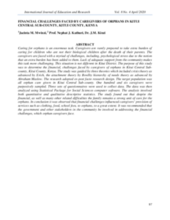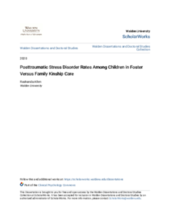Displaying 91 - 100 of 576
This paper explores the experiences of Victorian foster and kinship carers accessing timely health assessment and ongoing healthcare for a child placed in their care; identifying barriers and enablers.
This paper explores the experiences of Victorian foster and kinship carers accessing timely health assessment and ongoing healthcare for a child placed in their care; identifying barriers and enablers.
The purpose of this study was to determine the financial challenges faced by caregivers of orphans in Kitui Central Subcounty, Kitui County, Kenya.
This factsheet from Generations United provides grandparents who are raising grandchildren with resources and information on how to stay healthy, informed and connected in light of the COVID-19 pandemic.
This study aims to explore how young migrants in kinship care in a Swedish suburb describe what different places mean to them and what these descriptions can tell us about their sense of belonging.
This chapter examines the cultural logic of child care in Africa, focusing on one variation of fosterage, okutekula, among the Ova-ambo in Northern Namibia.
This study used wave 2 of the U.S. National Survey of Child and Adolescent Well-Being II (NSCAW II) to develop a new typology of kinship care based on financial mechanisms, including: (1) families that received Temporary Assistance for Needy Families (TANF) only; (2) families that received foster care payments only; (3) families that received both TANF benefits and foster care payments; and (4) families that received no payments.
The purpose of this study was to address the gap in the literature on the full spectrum of posttraumatic stress disorder (PTSD) attributes and symptoms for children living in nonkinship foster homes versus kinship foster homes, as well as examine the benefits and limitations of children placed in kinship and nonkinship foster homes.
This study reports findings from interviews with young adults with experience of kinship care in Ghana, about what lessons their kinship care experiences provided in their transition to adulthood.
The aim of this study is to explore how the social workers employed at a non-governmental organisation mentoring programme construct young migrants’ situations in kinship care in a Swedish suburb, and if and how these constructions change during the course of the programme.



